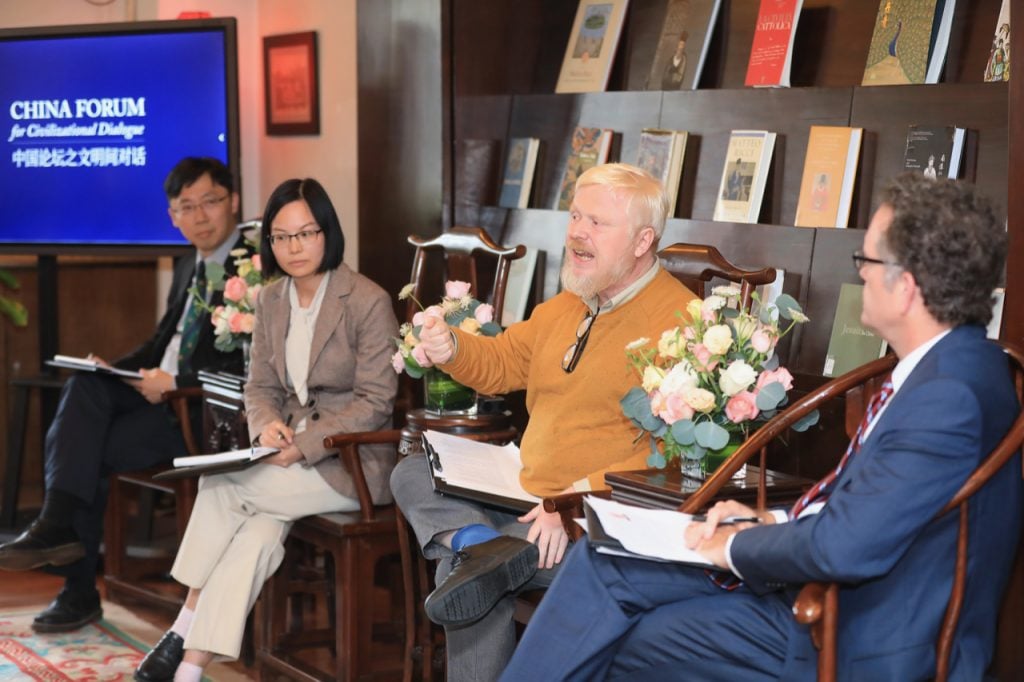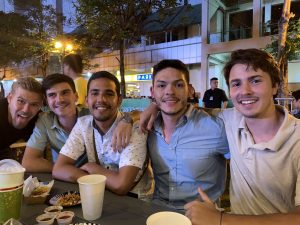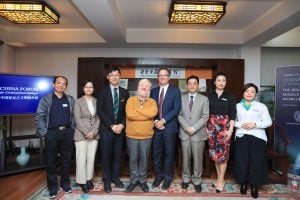
China Forum 2019: The Jesuits in China – Models of Intercultural Dialogue
On October 17, 2019, The Beijing Center for Chinese Studies (TBC) hosted China Forum – the first forum event held in Mainland China. The China Forum is a collaboration between Georgetown University and La Civiltà Cattolica that convenes Chinese academics and public figures with international partners to discuss common challenges at the intersection of culture, ethics, and global society. This recent event’s premise was on the view that today’s political and ideological divides make intercultural dialogue critically important to advance the global common good.
Acting as the moderator, Dr. Thomas Banchoff, vice president for global engagement at Georgetown University, began the event with a brief history of dialogue and cultural engagement in the Jesuit community, describing the challenges faced by the Jesuits from the time the Jesuit order was founded in 1540, to its re-establishment in 1814 and continuing into today. However, he says that among the negative headlines and tensions today, there is a renewed interest in cultural dialogue across religious, political, and other divides. Its versatility is displayed in the plurality of ‘models’ in the name of this event, which speaks to the diverse approaches part of this engagement.
As stated by Banchoff, the purpose of these discussions is to juxtapose the different perspectives from China and the West on common concerns of this ongoing cultural dialogue, especially within the Jesuit community. Much like the global dialogue occurring between different cultures, three panelists and two correspondents of different academic and cultural backgrounds, engaged in their own dialogue as they presented varying views on the imposing challenges and potential alleviators of cultural exchange in a global context. Each speaker presented their case by drawing from their area of expertise. To initiate the discussion, Banchoff asked the panelists to address their take on what characterizes Jesuit dialogue, what the successes and failures are, as well as the implications of the Jesuit culture in the contemporary era.
Fr. Benoit Vermander, S.J., professor and doctoral advisor at Fudan University started the discussion by defining success and failure – two words not found in the gospel. He said that success and failure mean ‘taking a position,’ where success is a process that can be achieved when one accepts what is happening. He went on to provide an insightful selection of encounters that speak to the Jesuit process. A noteworthy example mentioned, are the Jesuit missions from 1842 to 1949, where it was not East against West, but two contributing nationalities present during each mission (Italians and/or French with Chinese). Furthermore, what makes their missions so interesting is the divide that occurred from their interactions. The Jesuits in China were challenged by new ways, such as biblical chronologies versus Chinese chronologies or ‘what to call God in Chinese.’ This exchange of knowledge has paved the way for the ‘global endeavors in which all dialogues are crisscrossing.’ Lastly, Vermander points out that Jesuits should not focus on a single dialogue but remain at the intersection of several dialogues – acting as facilitators for other interpreters.
Dr. Simon Koo, executive director of The Beijing Center, followed Vermander’s talk by providing an in-depth analysis of how interculturality can be achieved. Quoting Fr. Sosa, Society of Jesus superior general, Koo stated that ‘one should be involved in interculturality without it being absolute.’ That, although in many instances of dialogue, altruism is to a certain extent necessary to initiate cultural dialogue, it, alone, is not enough – both sides must engage equally. That being said, Koo outlined three constructs from the Theory of Planned Behavior by which to adapt to a new cultural aspect. The three components – behavioral beliefs, subjective norm, and perceived behavioral control – speak to the motives and thought-process of adapting to a new culture. To support his analysis, he gave an example of how incentives can be created in a cultural exchange, allowing other cultures to see the beauty and/or usefulness of another culture. He explained how the Jesuits used different mechanisms to bring science, mathematics, new music, etc. to China to provide incentives for dialogue. In turn, Koo concluded his talk by reminding the audience that knowledge and education used to be a luxury but is now widely accessible in large part due to technology, leaving the audience to question whether the incentives for continuing dialogue are minimized in the modern age.
With a background in communications and journalism, associate professor Fangfang Ji from the Chinese Academy of Social Sciences, continued the discussion by speaking on the Jesuit influence in the context of intercultural communications. To support her inquiry, she used slides to guide her discussion on how Jesuits served as intermediaries in intercultural communication by establishing the first Chinese magazines/newspapers. In an effort to become accepted by local leaders, Jesuit missionaries wrote columns on teachings, science, and technology. Furthermore, Ji outlined the five components of communications: communicator, media, message, receiver, and effect, to relate Matteo Ricci’s role as ‘communicator’ as part of his dialogue with the Chinese. As communicator, Ricci dressed as a Chinese scholar (instead of as a monk) to alleviate his ‘foreignness’ and attempt to adapt to the local culture. As described by Ji, this exemplifies the strategy of ‘accommodation,’ which can be applied to the whole communication process. In relation to this process, Ji shared a personal example of her time in Uzbekistan, where the local people are putting great efforts into correctly portraying the cultural differences in language, from Uzbek to Chinese.
Following the panelists’ discussion, two correspondents – Bin You from Minzu University of China and Lionel Hong from Fu Jen Catholic University – brought the discussion together by assessing Ricci’s contributions, looking at modern-day perspectives on dialogues, and providing a concrete example of how cultures are in dialogue with one another. You spoke about the many ways in which Ricci made an effort to engage with the Chinese people. Apart from changing his clothing, Ricci developed a theological system according to Chinese cultural terms. This includes his perseverance to achieve lingual adaptation by correctly describing parts of the soul and God, for example. Ricci’s ability to integrate himself in Chinese culture, can still be seen today, as You related Chinese leaders’ enthusiasm for continuing intercultural dialogues, as highlighted during the 2013 UNESCO speech. Another example of intercultural dialogue present in the contemporary era, is the Jesuits’ contribution to music, as explained by music professor, Lionel Hong. Hong shared how Jesuits used hymns and translated them to Chinese for locals to use them in praise of God, while also incorporating the Chinese style of music from Western style. He demonstrated this change in musical style, by singing a hymn in both styles – a wonderful closing to the discussion.
Before the audience and guests enjoyed the reception in the TBC hutong, the audience had a chance to ask the panelists to elaborate on the ideas shared. The audience posed questions on how to incorporate dialogue today and how the exchange of knowledge can continue through a process of give-and-take, when it means something different in each place. The responses from the panelists spoke to the individual effort and readiness of people to be able to engage in intercultural dialogue and how Jesuit sinologists have their share of contributions to make as well. That being said, it is safe to say that this event resulted in an abundance of ideas and thoughts exchanged from professionals that have the ability to make a person question their own part in facilitating intercultural dialogue.
For more photos of the event, click here.
Learn more about China Forum and past events here.
Contact us to learn more about The Beijing Center’s facilities and how TBC can host your event here.
About the Organizers and Host
The China Forum, a collaboration between Georgetown University and La Civiltà Cattolica, convenes Chinese academics and public figures with international partners to discuss common challenges at the intersection of culture, ethics, and global society. Through academic seminars, public events, and an online platform, the China Forum will initially focus on three topics: the global ecological crisis; humanities education for a global era; and the ethics of artificial intelligence.
Georgetown University, one of the world’s leading academic and research institutions, offering a unique educational experience that prepares the next generation of global citizens to lead and make a difference in the world.
La Civiltà Cattolica, the most respected digital Catholic journal from Rome. A must-read on all the present issues alive in the Church. Discover top Church scholars interpreting the history, politics, culture, science, and art in the light of the Christian faith.
The Beijing Center (TBC), established in 1998 by Fr. Ron Anton, S.J., TBC serves as a hub for the international Jesuit higher education network in Mainland China. What makes us unique is our place in a long and storied tradition, starting with Matteo Ricci, of Jesuit learning engaging with Chinese culture.





